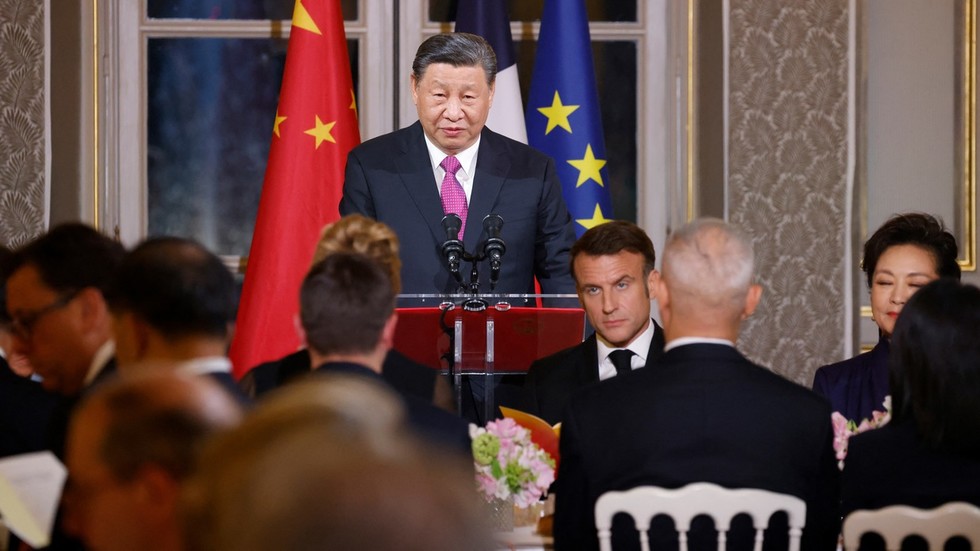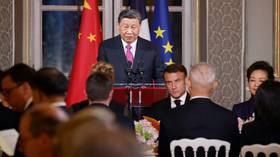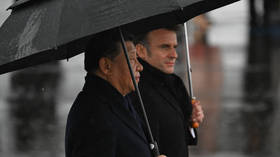
Western Europeans broadly see China as an opportunity, but Washington sees it as a threat. This has major geopolitical consequences

By Fyodor Lukyanov, the editor-in-chief of Russia in Global Affairs, chairman of the Presidium of the Council on Foreign and Defense Policy, and research director of the Valdai International Discussion Club.
By Fyodor Lukyanov, the editor-in-chief of Russia in Global Affairs, chairman of the Presidium of the Council on Foreign and Defense Policy, and research director of the Valdai International Discussion Club.
Russia in Global AffairsRGA on Telegram

Chinese President Xi Jinping speaks during a toast at an official state dinner as part of the Chinese president’s two-day state visit to France, at the Elysee Palace in Paris, on May 6, 2024. © Ludovic MARIN/AFP
Chinese President Xi Jinping is travelling in Europe for the first time in five years. His choice of capitals is calibrated. First was Paris, where French President Emmanuel Macron – who claims political leadership of the Western side of the continent – was joined by European Commission President Ursula von der Leyen. Together with Macron, she was in Beijing last year. Then there was Budapest and Belgrade, two European countries (one in the European Union, the other outside) that are showing an increased willingness to cooperate with Beijing.
China’s relations with Western Europe are one of the most interesting issues in contemporary world politics. Their view of the EU differs from that of Russia. Moscow has long since come to the conclusion that the Old World has completely abandoned its independent foreign policy course by aligning itself with the US. Brussels, Berlin, Paris, Helsinki and others seem not to be deterred by the consequences for their own prosperity and influence. Beijing, however, believes that the EU will not give up its autonomy, even if its dependence on American strategy grows. In other words, China thinks that a precise and active policy can create a series of incentives for the Western Europeans that will slow down their drift towards the US. And, accordingly, it will limit the bloc’s participation in a possible future military-political confrontation between the Washington and Beijing.
The research question, as they say in academic papers, is clear: Is the “collective West” a solid and sustainable union, or is the unity achieved so far more flimsy, camouflaging a growing divergence of interests?
The US sees China as a strategic rival for decades to come. Meanwhile, the EU doesn’t see it as a direct threat, although it is wary of Beijing’s growing power, including in the European region. The US sees Russia as a direct threat to European stability, but not as a serious threat to itself. But, of course, Western Europe is very afraid of Russia, and this fear is growing, leading to speculation about a variety of scenarios. At the same time, the US needs Western Europe for its strategy of containing China.

Read more
First, in the economic and technological sense, the EU should not develop cooperation with China in areas where the US wants to limit Beijing. Concurrently, the bloc needs the US to contain Russia in the military and military-technical sense. There are discussions about building up the EU’s own capabilities, but firstly they are rather abstract and secondly the process will take years. There is already an awareness of Western Europe’s over-dependence on America, but there is no way to solve the problem, and this is pushing the Old World to try to keep Washington as close as possible.
China is guided by the logic of economic pragmatism – why should the EU reduce its own capabilities? Indeed, for the last three or four decades, the bloc has dominated the world, and China has been its main beneficiary, transforming itself from a poor and backward country into a contender for world domination. Now, however, the logic of strategic competition is coming to the fore, and market profit is becoming a casualty.
But China has its own reasons. From Beijing’s point of view, the general direction of global development is towards economic interdependence and the need for everyone to expand the space for such relations. The renaissance of blocs, reminiscent of the Cold War, is not a prototype for the future of politics but a reversion to the past, a rearguard action of the twentieth century. In fact, the rivals of the time (Washington and Moscow) are trying to finish a game that didn’t end with a formalized result at the turn of the eighties and nineties. China is every afraid of being drawn into this process, believing, not unreasonably, that the side that avoids costly (in any sense of the word) conflicts will benefit most.
Hence China’s cautious stance on the Ukraine issue. Beijing firmly avoids criticizing Russia and expresses understanding for the reasons that prompted the military operation. However, it does not express direct support and treads very carefully so as not to give Washington an excuse to impose sanctions on its companies for violating the Western embargo on Russia. We should not expect a different position from Beijing, and it is even possible that the rhetoric about the need for a peaceful end to the conflict will intensify. A certain indicator will be the conference on Ukraine (initiated by Kiev) to be convened in Switzerland next month. The presence or absence of the Chinese will give it a different tone. Indeed, this is clearly what the organizers themselves believe.
Whether China will be able to weather the current storms to gain even more weight on the world stage remains to be seen. The same is true for the US, although much will depend on the outcome of the November elections. Putin and Xi Jinping will have much to discuss when they meet, apparently next week.
This article was first published by Rossiyskaya Gazeta newspaper, translated and edited by the RT team




